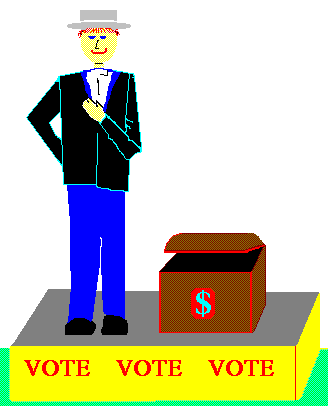 | ||
 |
> Stories and Games | > Devious Politician |
The story of the devious politician

In this particular nation, as with many nations in the early days of democracies, there was no secret ballot. Therefore he made the following proposal to the electorate:
"Dearly beloved, I have an excellent proposal for you. For each and every person who votes for me, I will pay them $100. After I am elected, I promise to raise a tax levy of $1000 per person. This tax revenue will be used to pay for my new mansion, my new yacht, my new swimming pool, and other things that a smart fellow like me deserves."
Dear reader, if you lived in this nation, would you vote for him? Here is his explanation of why you should:
"It's simple," he says, "you simply calculate the expected value of each alternative."
|
Expected Value = odds of achieving an outcome x dollar value of the outcome |
"To state this more precisely, expected value is the probability of something occurring multiplied by the gain or loss which would occur."
"A rational person will chose the alternative which yields to him the greatest expected value."
"If you vote for me, the odds of earning $100 are 100%. If you do not vote for me, the odds of earning $100 are 0%."
"The odds of me being elected and adding $1000 to your taxes are unknown. You cannot predict how others will vote, and your own vote will have a negligible effect. Therefore you can consider the election to have a random outcome. There is one other candidate, so there are two possible outcomes. Either he will be elected or I will. In other words, the odds of me being elected are one in two, or 50%."
"Now, the expected value of your financial position can be calculated as follows:
|
If you vote for me: Expected value = (100% x $100) + (50% x -$1000) = -$400 |
|
If you vote against me: Expected value = (100% x $0) + (50% x -$1000) = -$500 |
"Clearly the rational person must vote for me, because he can expect to lose only $400 instead of losing $500."
What do you think will happen? Would you vote for him and collect $100? Will he win?
Comments on the story
The outcome depends on the nature of the individuals who make up the electorate. Are they motivated by self interest, or by altruism? Are they short-sighted, or do they see the big picture?
Although the preceding example is contrived, it does make it obvious how acting on a narrow view of self-interest might produce an unwanted outcome.
In textbooks on economics, the pursuit of self-interest is supposed to be benign. Sellers seek the highest price for their goods, and buyers seek the lowest. Through competition between sellers, the price is theoretically brought down to the lowest possible level that still provides a living to the sellers. That might work in a competitive market, but as we have seen, it doesn't work well in all situations.
Perhaps the politician in this story is too blatant to get away with his trick, but real world politicians sometimes find more subtle ways of doing the same thing. It isn't unusual for politicians to try to buy votes with the voters own money.
Here's an example of how this is done: The politician offers a subsidy to some special interest group, such as the members of sports clubs. Club members think this is great because the cost will be paid primarily by people other than themselves. The club members might pay more tax because of this, but the member's grant exceeds the per-person tax increase required. Therefore the members suppose that they will be better off.
However, what the sports club members don't notice is that the politician is also offering a subsidy to home owners for maintenance work on their homes. Nor do they notice that the politician is offering a rent subisdy to tenants of appartments. Also there is a grant for cultural organizations, a grant for students, a grant for parents with young children, etc.. The politician has every segment of the population covered with his promises. He wants each person to think they will be better off at everyone elses' expense.
Of course, not every political promise in this world is a devious trick. If each voter is glad to pay for worthwhile things that benefit other people, there is no problem. The problem arises if each voter takes a self-interested viewpoint without considering the big picture.
Also, the real world contains more than one way of voting, and they don't all involve politicians. For example, consider a person who throws trash out of their car window onto the roadside. That might be a handy way of getting rid of it, and maybe other people do it too. But consider what each of these people is really doing. They are voting with their actions to turn that road into a trashy, unslightly route.
Actions of various sorts can have a "voting effect." Here's something you can ask yourself repeatedly as you make various decisions in your life: What kind of world are you "voting for" with your behavior?
Perhaps the theory described by the devious politician was wrong! Instead of acting based on a narrow, self interested view, it may be better to consider the big picture and vote for the kind of world you want to live in!
What do you think of the content on this web page?
| Site Search | |
Return to Universal Ethics home page |
The Story of the Devious Politician, story and illustration copyright Arthur de Leyssac, 1993, All rights Reserved.